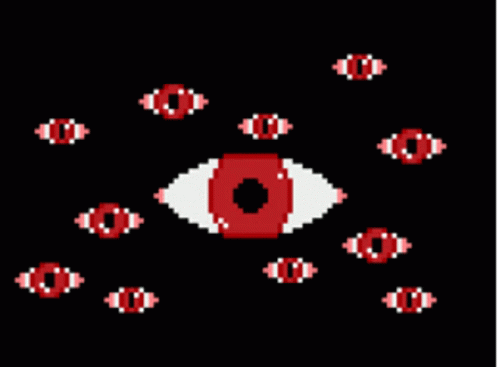
Surveillance and its Different Forms Revisited
An analysis of Edgar Allan Poe’s short story ‘The Tell-Tale Heart’, published in 1843.
THE SPY ISSUE
Sophia Dax Kerr
11/30/20234 min read
In medias res, Edgar Allan Poe’s “The Tell-Tale Heart” opens with a man speaking to some unknown other, yet whether it is to the reader or himself is worth meditating upon. It begins with an unnamed, “fancy-me-mad” narrator who adamantly maintains that he is sane and stable, dissolving the idea of having this “strange illness”, (one that has supposedly led to him murdering the Old Man, Poe’s secondary character). With the protagonist’s boast-like tendencies, he reassures the reader how one “madman” cannot execute a crime with such precision and uniformity; “So you think I am mad? A madman cannot plan”. He fuels this assertion by trailing back to the steps of what he did to the body; “first I cut off the head, then the arms and the legs… careful not to let a single drop of blood on the floor’’. His steady composure indeed refracts from any inclination of insanity. Yet, if it wasn’t the illness that pushed him to kill a man he “even loved”, what exactly set the trigger? Soon after the introduction, he precisely reveals what compelled him to be the culprit of an old man’s demise; not a personal vendetta against the man himself, as one would think, but rather his Eye, his Evil Eye. Here is ultimately where the crux of the narrative lies. It revolves around this eye. The heaviness of the word itself is apparent with it being repeated fifteen times, amplified by the homophony of the terms “eye” and the first person “I”, the identical sound ringing out in omnipresence.
My role in this article is to not only interpret its meaning but to exhume the different forms of surveillance Poe implicitly develops in writing, leading to the short story’s crippling culmination of unease.
My primal focus will be on the narrator’s hypersensibility. He consistently reminds us of the Evil Eye’s ominous presence- its threat is so potent that the mental grips of his own sanity start to loosen, as if the brewing intensity of its glare gradually infuses into his own being. Not only this, but his sense of hearing equally becomes overbearing; “I could hear sounds I had never heard before. I heard sounds from heaven, I heard sounds from hell”. I mean, the guy is so adamant about holding a firm clutch on the reigns of his mind, yet by the end of the tale, once the police officers have come in for interrogation, his loss of composure becomes progressively apparent as a “strange sound in [his ears]” rings “louder” and “faster”, destabilising the cool façade he has been keeping up until that point.
The sensory overload catalysed by the conjunct ticking of the clock and the imaginary beating of the old man’s heart eventually gives way to the upkeep of his secret; his conscience implodes by such psychological pressure; “Yes! Yes, I killed him. Pull up the boards and you shall see! I killed him. But why does his heart not stop beating?! Why does it not stop?”. These heightened senses draw us to the first, most apparent layer of surveillance in “The Tell-Tale Heart”. We are dealing with a man’s mental dismantlement from the outside world, his paranoia birthed by what he refutes since the beginning; the “strange illness”, voir schizophrenic episodes.
Poe’s protagonist perfectly forging into the template of a “sick man”, however, must be debunked through metatextual interpretation. The Eye, which the young man feels so whimsically susceptible to, isn’t a mere figment of his imagination. What he continues to press on is not an old man’s menacing stare; it is the eye of the reader. Only once we, the real culprits, begin to read the short story, do we intrude on his mental state, by creeping into his psyche and absorbing in his thoughts through our simple pleasures of reading. Rather than so-called psychiatric spells of hallucination, we could say the narrator’s hyper-sensibility is caused by his “gift” of engulfing such meta-dimensional weight… It is his ability to sub-consciously be aware of the reader’s gaze that renders him “ill” and disconcerted, so much so that he is driven to the depths of killing to “close the eye forever”. A madman or a medium? Unfortunately for him the latter he cannot begin to fathom, nor put into words. All he can do is blame the eye and attempt to annihilate it, in vain.
A quote cites “His eye was like the eye of a vulture, the eye of one of those terrible birds that watch and wait while an animal dies”. Here, Poe could be using the technique of mirroring– where vultures prey on the body the same way we prey on the narrative, our inquisitive appetite increasing as we anticipate the man’s spiraling descent until its climax… I mean, how would you act if you felt somewhere inside you something was watching, feeding into the course of your own life? Thought so too.
The second layer of spying unfolds when the narrator reverts us to the past, describing the moments leading up to the old man’s death. Interestingly, an inverted shift of surveillance roles takes place; he who feels repressed by an inexplicable weight now becomes the repressor of an elder man’s own sense of security. Feeling an unknown presence in his chamber, the secondary character’s senses are similarly heightened, his sixth sense of death pervading the comfort of his sleep, apprehending his fate which is metamorphosed as the visitor in the room; “he knew that Death was standing there”. Whether he feels the cause to be natural or inflicted, the old man seems to know what impends on him; an unfathomable comprehension of his dreaded demise. Thus, Edgar Allan Poe in his tale draws symmetry between these two characters through shared internalized fears of the Eye and its representation- the voiceless resident, the unknown- with its macabre foreboding being typical of 19th-century gothic fiction.
Another minor layer of surveillance is the role of the neighbors. After hearing the old man’s scream through suffocation, they call the police to have the scene investigated.
Mm, even the walls have ears. Indeed, through this ordinary act of reporting precipitates Poe’s fourth dosage of espionage; the intrusion of the police officers, infiltrating the crime scene in hunt of the truth.
These four different coats of sight and spying contribute to the crescendo of amalgamated paranoia felt at the end, with the simple presence of the officers tipping the narrator off. Poe has captured the heaviness and anxiety-inducing pressure of feeling watched, whether it be conscious or subconscious. Moreso, he captures the agonizing inescapability one feels under the glare of madness, death, and surveillance, disrobing the readers who themselves surely feel unsettled by such torturous feeling. I mean, It’s excruciating. Who’s the real victim here?
xoxo, Sophia Dax Kerr
